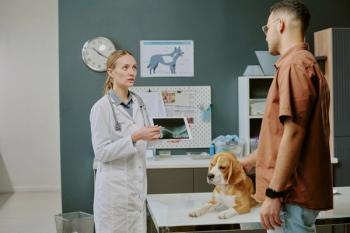
Just Bust a Myth!: Canine Food Allergies Demystified

In this live recordings of The Vet Blast Podcast presented by dvm360, explore the challenges and best practices for food allergy diets in canine patients
This episode is sponsored by Blue Buffalo
On this special episode of The Vet Blast Podcast presented by dvm360, Natalie Marks, DVM, CVJ, CCFP, Elite FFC-V, takes over as host to sit down with Joya Griffin, DVM, DACVD, and Julia Miller, DVM, DACVD, to talk dermatology myths. Throughout the epsiode, Miller and Griffin explain to Marks the different misconceptions there are out there, including at-home allergy tests and top allergens, to help give general practitioners tips and tricks on dealing with the dermatology cases that walk through the doors of their clinic.
Below is a partial transcript, edited lightly for clarity
Natalie Marks, DVM, CVJ, CCFP, Elite FFC-V: So what we wanted to start with is to just be real and to see how many of you actually like doing diet trials in practice. That's what we thought. Yeah, correct. No, it's very challenging, right? I mean, having obviously recommended, I'm sure many of us having done it personally, maybe we have uncooperative spouses or partners or children or all of the above, or our own admitted self, that's not helping to keep compliant. It's really important, I think, for us, especially in general practice, to be choosing wisely. We don't recommend food trials for everything, right? Because we're not going to get the complaints, and maybe it's not necessary. So think to set the stage, I wanted to ask Joya and Julia, how often do we actually see true diagnosed food allergies in our canine patients?
Joya Griffin, DVM, DACVD: the numbers are kind of all over the board, I think, but up to about 20% so it's still a fairly small percentage, I think you know, especially when we're talking about non seasonal pruritus patients that have recurrent otitis, sometimes perianal pruritus, those types of symptoms, and even if they have concurrent GI symptoms like vomiting, loose stool, diarrhea, those things all put together, it's still 20% or less.
Julia Miller, DVM, DACVD: Yeah, they're not that common. I mean, they are out there, right? And I think the true food allergy alone, that truly only has a food allergy is a pretty rare bird. Truthfully, we do see, I think, more and more combinations of atopic dogs that also have a food component, those are the hardest, right? They're the hardest to manage because they can be the hardest to diagnose, and that percentage gets up a little higher, you know, in that 20ish range. But certainly just a true pure food allergy is not a common thing. So a diet trial should not be something you recommend for every patient every time it is important that you still have good selection of what patient you think might actually have a food allergy.
Newsletter
From exam room tips to practice management insights, get trusted veterinary news delivered straight to your inbox—subscribe to dvm360.



